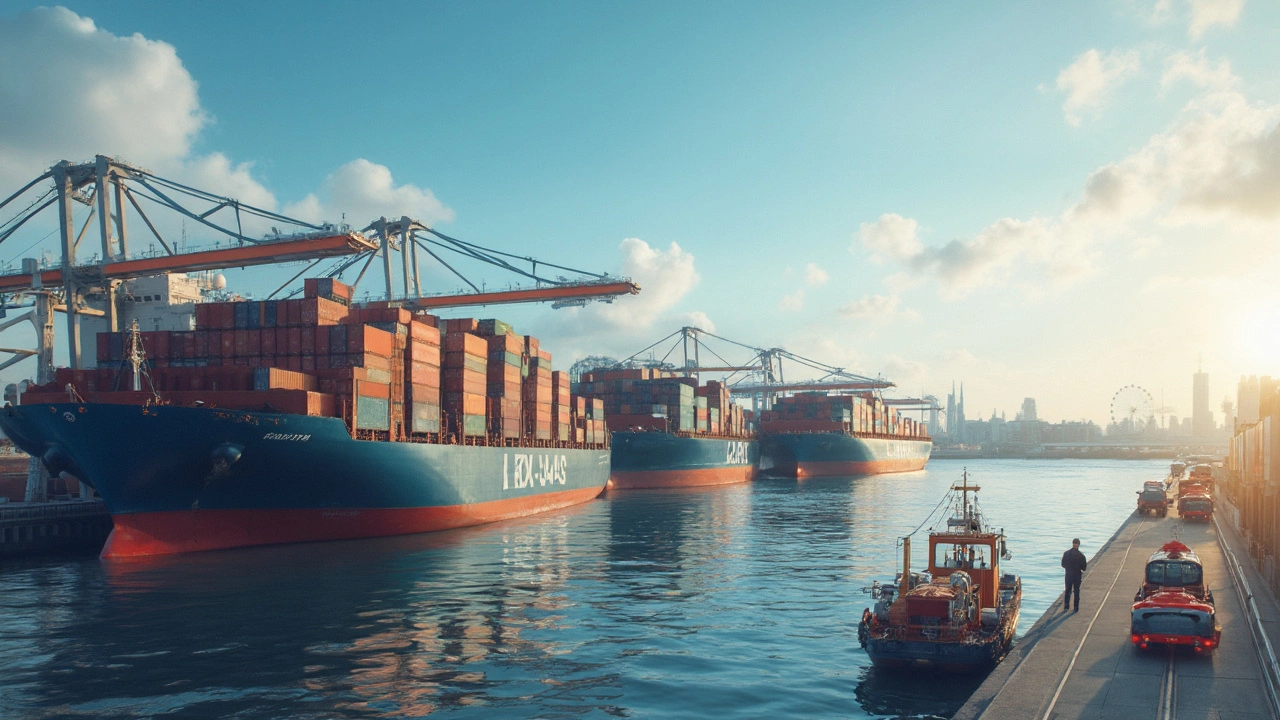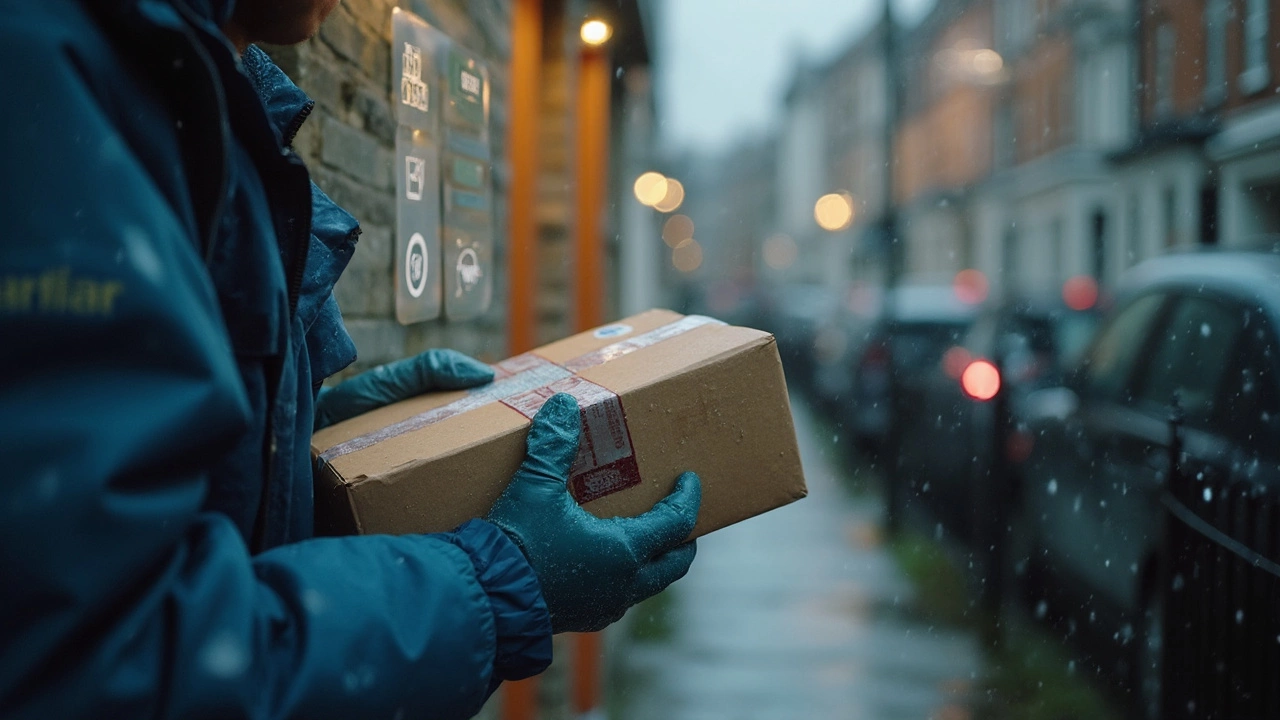Most Reliable International Shipping Company: Who Tops the List in 2025?

Ever had a package go missing halfway to another country? You’re not alone. Shipping internationally is tricky—there’s customs, unexpected weather, and ever-changing rules. That’s why a shipping company’s reputation matters way more than their ads or flashy websites. Businesses lose millions every year just because their shipments got delayed or lost in transit.
If you depend on getting products across borders, you want a company that’s more like a trusted partner than just a delivery guy. It’s not just about getting something from point A to B. It’s about on-time arrival, real-time tracking, no nasty surprise fees at customs, and actual help when things go wrong.
People keep asking, who’s actually good at this? The names you see everywhere—like DHL, FedEx, UPS, and Maersk—aren’t just lucky. They’ve spent billions on tech, customer support, and local partnerships so they can handle anything from missing paperwork to rerouting shipments when borders close suddenly. But that doesn’t mean every big brand is the best fit for your needs.
- Why Reliability in International Shipping Matters
- What Makes a Shipping Company Dependable?
- Leaders in the Global Shipping Game
- Real-World Tips for Picking a Reliable Shipper
- Common Pitfalls and How to Avoid Them
Why Reliability in International Shipping Matters
Getting your package delivered on time isn’t just a nice bonus anymore—it can make or break your business. In 2024, over 2 billion packages crossed borders each month, and lost or delayed shipments led to real headaches. Companies reported losing up to 15% of their annual revenue just because their shipments didn’t show up when they were supposed to.
When you’re dealing with customs paperwork, port traffic, and unpredictable weather, things can go sideways fast. One delay can mess up your whole supply chain. Imagine a factory waiting on a critical part, or a customer checking tracking updates a dozen times a day. If your shipping company messes up, you lose trust—and your reputation.
Choosing a reliable shipping partner means fewer sleepless nights. Reliable shippers invest in tracking systems, experienced staff, and quick responses when something goes wrong. Here’s why that’s a game changer:
- Consistent delivery times: You can plan your schedules and keep promises to your customers.
- Accurate tracking: Instead of waiting in the dark, you (and your clients) know exactly where packages are.
- Fewer missing or damaged parcels: Less stress and fewer refunds.
- Clear customs support: Someone’s got your back if paperwork gets complicated.
- Better customer loyalty: People stick with businesses that deliver what they promised, on time.
If your package is just a week late, a customer might choose a different brand next time. That’s why reliability isn’t just about convenience—it’s about protecting your bottom line and your reputation. The most successful businesses trust shippers who make reliability a priority every single day.
What Makes a Shipping Company Dependable?
If you’re shipping stuff across borders, you need more than just a truck and a plane. What sets the international shipping big names apart is how seriously they take reliability. The best companies have tight operations behind the scenes, and that pays off when you need your packages to land on time.
Let’s break down the stuff that actually makes a shipping company trustworthy:
- On-time performance: You want a company with a solid track record. For example, in 2024, DHL’s international deliveries arrived on time 92% of the time, even with tough weather and border checks.
- Real, no-BS tracking: Top companies let you see where your package is at every step. FedEx and UPS both send real-time updates, and you can even get alerts on your phone.
- Transparent pricing: No one likes surprise fees. Reliable shippers spell out customs, taxes, and delivery fees up front. That’s a deal-breaker for small businesses trying to keep costs under control.
- Responsive customer support: Lost in customs? A good company picks up the phone or answers your chat in minutes—DHL’s international support answers most calls in under three minutes, based on 2024 stats.
- Problem-solving muscle: When borders close, pandemics hit, or weather turns wild, the best companies reroute shipments or handle paperwork without you even knowing there was a hiccup.
Documentation and customs clearance are big headaches for a lot of shippers. The top players invest in software and local staff who actually know how to avoid paperwork delays. That’s a lifesaver when you’re sending stuff to places like Brazil or India, where customs can chew up weeks if you get it wrong.
Check out some real data comparing leading companies’ strengths from 2024:
| Company | On-Time Rate | Avg. Customer Support Response Time | Global Coverage (Countries) | Customs Support |
|---|---|---|---|---|
| DHL | 92% | 3 mins | 220+ | Excellent |
| FedEx | 89% | 5 mins | 210 | Very Good |
| UPS | 90% | 6 mins | 200 | Good |
| Maersk | 88% | 7 mins | 130 | Specialized (Freight) |
Choosing the right partner goes beyond price. Watch for these signs: clear communication, honest answers about delays, and proactive support if something gets stuck. You want a company that treats your cargo like it actually matters—not just another barcode.

Leaders in the Global Shipping Game
When you talk about the international shipping scene, a few names always rise to the top. These global giants aren’t just big—they’re efficient, reliable, and have battle scars from dealing with the weirdest shipping nightmares you can imagine.
DHL Express has built a reputation for super-fast delivery times, especially to places most people can’t find on a map. DHL covers over 220 countries, tracks everything, and is known for handling customs paperwork like a pro. It's often the go-to for ecommerce brands wanting speed and reliability worldwide.
FedEx is the king of tracking and transparency. Their real-time tracking updates set the standard, and they stand out with their overnight and time-specific delivery options. FedEx also has a strong system for handling claims if your package goes sideways.
UPS isn’t far behind. They handle a mind-blowing number of international shipments every year and tend to offer the best prices for heavier or bulk shipments. Their logistics network in the US and Europe is downright massive, and they usually come through if you’re shipping business-to-business.
Maersk is a big player, but in a different way—they dominate ocean freight. Around 17% of all worldwide containers move on Maersk ships. If you're sending bulk cargo or anything that fits in a shipping container, they're almost impossible to beat for reach and reliability.
Here’s a quick peek at how these companies stack up on some must-know stats from 2024:
| Company | Global Reach (# countries) | Average On-Time Rate | Specialty |
|---|---|---|---|
| DHL | 220+ | 97% | Express air delivery, customs expertise |
| FedEx | 220+ | 96% | Fast tracking, reliable overnight |
| UPS | 200+ | 95% | Bulk shipping, business-to-business |
| Maersk | 130+ | 98% | Ocean freight, bulk containers |
One detail that gets overlooked: Each company’s strength depends on what and where you’re shipping. For example, DHL crushes it if you need to reach remote countries fast. Maersk is the boss of massive, heavy cargo. And if you’re after customer service, FedEx and UPS usually have real human support, even during wild delays or customs problems.
Here are some quick tips when deciding between these leaders:
- If speed matters most, go with DHL or FedEx.
- For high-volume or heavy freight, UPS and Maersk are often best.
- Look up real customer reviews for your target country—performance can vary by region.
- Check each company’s customs support and claims process before shipping valuable stuff.
Real-World Tips for Picking a Reliable Shipper
Choosing the right company for international shipping can make or break your delivery experience. Don’t just go for the brand with the biggest ads. Instead, pay attention to a few practical things that really matter in the real world.
- Check delivery guarantees and actual performance. It’s common for companies to promise fast delivery, but their track records say more. For example, DHL Express consistently delivers over 95% of its shipments on time worldwide, according to ShipMatrix data from late 2024.
- Dig into their customs expertise. Some countries have rules that change overnight. FedEx and UPS have specialized customs support teams, which helps cut down on shipping delays due to paperwork hiccups.
- Read real customer reviews—especially the negative ones. Go beyond the five-star ratings and look for patterns in complaints. Repeated customer frustrations about missed pickups or poor tracking usually mean it’s not a one-time glitch.
- Test their tracking and customer support. Before sending a big shipment, try a small one. See how their tracking works, what info you get (DHL, for instance, updates tracking every step of the way), and how quickly their support team answers your questions.
- Watch out for hidden fees. Last year, about 30% of international parcels from new sellers got stuck at customs due to unpaid duties, according to Pitney Bowes. Good shippers will give you a duty calculator or break down costs before you click send.
Here’s a quick look at how the top companies stack up on a few essentials:
| Company | On-time Delivery (2024) | 24/7 Support | Customs Assistance |
|---|---|---|---|
| DHL | 95% | Yes | Strong |
| FedEx | 93% | Yes | Very Good |
| UPS | 92% | Partial | Very Good |
| Maersk (freight) | 89% | Yes | Good |
Final tip: local experience counts. Big companies are reliable, but sometimes a local expert gets the job done faster for certain routes (think Yamato for Japan or Aramex in the Middle East). Always balance global muscle with regional know-how.

Common Pitfalls and How to Avoid Them
Even experienced shippers hit snags when sending things across borders. It’s easy to think a package will just go where it needs to. But there are a few stubborn problems that trip up both businesses and regular folks, no matter how careful you are. Avoiding these mistakes means fewer headaches and way less stress.
First up: poor paperwork. About 15% of shipments held by customs last year were because of incomplete or incorrect forms. Screwing up basics like commercial invoices or declarations can put your delivery on hold for days, sometimes even weeks. Always double-check your documents before the box leaves your hands.
Then there’s hidden costs. It’s tough to spot them until you’re charged. Watch for things like fuel surcharges, remote area fees, and duties that aren’t obvious at checkout. Carriers like DHL are fairly transparent, but stories about surprise FedEx international surcharges pop up all the time. Want to dodge this? Ask for a breakdown of fees in writing before committing.
Tracking issues also drive people nuts. It’s 2025, and still, not every carrier offers real-time, end-to-end tracking in every country. Losing visibility mid-shipment happens a lot with local partners or during customs inspections. If you need tight control, stick with companies that offer complete tracking or combine your shipments for better oversight.
Package damage remains a stubborn issue. According to recent logistics data, about 1 package in 200 shipped internationally gets damaged. Flimsy packaging or skipping insurance is a shortcut to disaster. At minimum, use sturdy boxes and lots of padding. The extra cost for "fragile" stickers and insurance almost always beats replacing the goods later.
Here’s a quick look at what causes the most trouble, and what you can do about it:
| Pitfall | How Often It Happens | Simple Fix |
|---|---|---|
| Incorrect paperwork | 15% of shipments delayed | Double-check forms, use templates |
| Hidden fees | 1 in 4 shipments faces a surprise charge | Get an itemized quote before booking |
| Tracking gaps | Happens with 12% of parcels | Choose a reliable shipping company with full tracking |
| Package damage | 0.5% affected | Invest in tough packaging, buy insurance |
One last thing: Don’t forget about shipping restrictions. Countries are strict about what you can and can’t send—lithium batteries, certain foods, and cosmetics often get sent back or destroyed. Check lists published by your carrier and border authorities before you ship; it saves money and hassle.